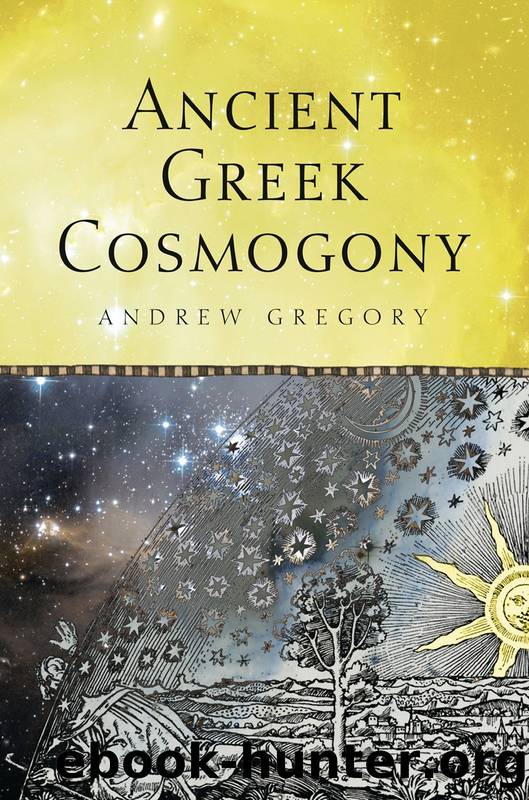Ancient Greek Cosmogony by Gregory Andrew

Author:Gregory, Andrew
Language: eng
Format: epub
Publisher: Bloomsbury UK
Published: 2011-07-14T16:00:00+00:00
VII. A qualified literal view
At a more strategic level, the argument for the metaphorical view is that the description of chaos is incoherent, so much so that Plato must have realised and intended this, and he intends us to draw the conclusion that he did not really believe in the pre-cosmic state. The literalist reply though is that this does not necessarily follow. Even if it is granted that the description of chaos is problematic and intentionally so, the challenge might be quite different. It may equally be that we are intended to draw some distinctions and so make the account coherent, or as I have suggested above, that we recognise the possible depths of chaos and how that might affect any account of cosmogony, and read the differing levels of chaos as problematic for the atomists and Empedocles.
The metaphorical interpretation was subsequently the majority view of later Platonists in antiquity. According to the modern metaphorical view, this is good evidence in favour of their interpretation.44 In reply, the literalists say that Aristotle is clear that Plato’s cosmogony is to be taken literally. At On the Heavens 279b12ff., he gives a brief survey of his predecessors’ views on cosmogony. He says that while all thinkers believe the kosmos to have a beginning, some believe it to perish, some believe it to be everlasting once generated, and Heraclitus and Empedocles hold a cyclical view. Aristotle is critical of those who believe the kosmos to be generated but indestructible. Aristotle is about to launch into an argument, spanning several chapters of On the Heavens, that it is impossible for anything to be both generated and indestructible. According to him, only something which is ungenerated may be indestructible. It is difficult to believe that Aristotle would be mistaken on something so specific as whether Plato’s cosmogony should be taken literally,45 especially when he is aware of an alternative interpretation.46 Aristotle tells us, at On the Heavens 279b33ff., that according to some Plato’s expressed view on cosmogony was meant to be taken as something for the sale of instruction, as a mathematician might use a diagram, making something easier to understand.
There is significant opposition to the metaphorical view among ancient Platonists, notably from Plutarch, Atticus and Philoponus, and considerable debate on what ‘generated’ might mean in relation to the kosmos. The evidence of all later Platonists and commentators is suspect, though, as some have other agendas. Some wish to harmonise Plato and Aristotle, and so adopt a metaphorical view. In general, pro-Christian Platonists adopt a literal view, anti-Christian Platonists do not. There is also the issue of several highly influential anti-cosmogony arguments which may have persuaded Platonists, motivating them to interpret the Timaeus metaphorically. Questions around the issue of what god was doing prior to the generation of the kosmos (what was he doing? why did he delay doing good? why did he change his mind?) were much discussed. Another highly influential anti-cosmogony argument was Aristotle’s that anything indestructible must also be ungenerated. One
Download
This site does not store any files on its server. We only index and link to content provided by other sites. Please contact the content providers to delete copyright contents if any and email us, we'll remove relevant links or contents immediately.
| Aeronautics & Astronautics | Astronomy |
| Astrophysics & Space Science | Comets, Meteors & Asteroids |
| Cosmology | Mars |
| Solar System | Star-Gazing |
| Telescopes | UFOs |
Tools of Titans by Timothy Ferriss(8359)
Turbulence by E. J. Noyes(8014)
Secrets of Antigravity Propulsion: Tesla, UFOs, and Classified Aerospace Technology by Ph.D. Paul A. Laviolette(5363)
Astrophysics for People in a Hurry by Neil DeGrasse Tyson(5172)
Room 212 by Kate Stewart(5102)
Design of Trajectory Optimization Approach for Space Maneuver Vehicle Skip Entry Problems by Runqi Chai & Al Savvaris & Antonios Tsourdos & Senchun Chai(5061)
Pale Blue Dot by Carl Sagan(4992)
The David Icke Guide to the Global Conspiracy (and how to end it) by David Icke(4694)
A Journey Through Divination and Astronomy by Publishing Pottermore(4373)
Goodbye Paradise(3795)
Apollo 8 by Jeffrey Kluger(3700)
COSMOS by Carl Sagan(3615)
The Five People You Meet in Heaven by Mitch Albom(3549)
Losing the Nobel Prize by Brian Keating(3531)
How to Read Water: Clues and Patterns from Puddles to the Sea (Natural Navigation) by Tristan Gooley(3454)
Brief Answers to the Big Questions by Stephen Hawking(3416)
How to Read Nature by Tristan Gooley(3322)
The Order of Time by Carlo Rovelli(3180)
A Brief History of Time by Stephen Hawking(3015)
